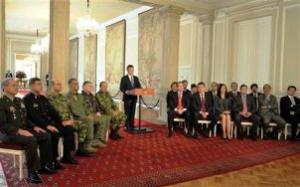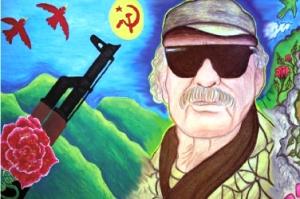Consequences of Prohibition
Drug War Issues
Politics & Advocacy
For the first time in nearly a decade, the Colombian government will sit down for peace talks with the Marxist guerrillas of the FARC, which has been fighting to create a socialist Colombia since 1964. President Juan Manuel Santos broke the news in a nationwide address last Tuesday night, and the FARC have confirmed that the talks are on.

President Santos addresses the nation on peace talks. (presidencia.gov.co)
The announcement of peace talks does not mean an immediate end to the fighting, however, and that could prove problematic.
"Military operations will continue with the same or stepped-up intensity," Santos said, adding that the talks would not be open-ended. "They will be measured in months, not in years," he said. "If there are not advances, we simply won't continue."
"It's going to be so much harder to negotiate while people are being extorted and oil pipelines are being attacked, child soldiers are being recruited and land mines are being laid," Adam Isaacson, a Colombia expert with the Washington Office on Latin America told the Associated Press.
The agreement was brokered with the assistance of Cuba and Norway, which will "facilitate" the coming peace talks. Chile and Venezuela will act as observers.
The last round of peace talks between the government and the FARC went on fruitlessly for more than three years beginning in 1999 and ended when a frustrated President Pastrana sent the Colombian military into the FARC safe haven Pastrana had ceded at the beginning of the talks.

FARC art (farc-ep.co)
But the FARC has also been killing Colombian soldiers at a higher rate than ever. It remains ensconced in its rural redoubts supported by a loyal peasantry, and continues to profit from the coca and cocaine trade.
The FARC's role in the drug trade will be a complicating factor in the talks. The US is seeking five of the group's six secretariat members on drug trafficking charges.
The FARC also seeks fundamental reforms in the Colombian state and economy, which is also likely to prove problematic. Although President Santos has signaled he is willing to discuss agrarian reform and rural development, he is likely to run into fervent opposition from wealthy rural interests who allied themselves with former President Alvaro Uribe and rightist paramilitaries during his term in office.
The paramilitaries killed thousands and generated tens of thousands of internal refugees, trafficking themselves in cocaine the whole time, until they reached an agreement to demobilize under Uribe.
Will the world's oldest insurgency be coming to an end soon? Stay tuned.
This work by StoptheDrugWar.org is licensed under Creative Commons Attribution-ShareAlike 4.0 International
Comments
If Colombia legalizes or
If Colombia legalizes or decriminalizes their dope, then FARC doesn't have a chance to fund themselves . . . makes sense why peace would be an option.
Add new comment